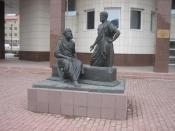1
Compean
Krystyne Compean
Philosophy 1301
ESSAY ONE
In the beginning of Euthyphro, Socrates does not present his own account of piety. I He is asking for Euthyphro's definition of the word to help him understand so that he can use it for his own benefit in trial. "Tell me then, what is pious, and what the impious, do you say" (Plato, Euthyphro, Grube)? Euthyphro says, "I say that the pious is to do what I am doing now, to prosecute the wrongdoer" (Plato, Euthyphro, Grube). This does not give Socrates the satisfaction because this is only an example and not a definition. Euthyphro then gives him the definition "What is dear to the gods is pious, what is not is impious" (Plato, Euthyphro, Grube). Throughout this conversation, Socrates and Euthyphro go back and forth on this subject and determine that the gods would not agree on piety.
Finally Euthyphro gives him another definition, "The godly and pious is the part of the just that is concerned with the care of the gods, while that concerned with the care of men is the remaining part of justice" (Plato, Euthyphro, Grube). Socrates acquires more information from Euthyphro on this definition that leads them to Socrates description of piety. He states, "Piety would be a knowledge of how to give to, and beg from, the gods" (Plato, Euthyphro, Grube). Socrates says that if this were true, then piety would be a trading skill between gods and men (Plato, Euthyphro, Grube). This statement brings them both back to the beginning where they began and leaves them with an unanswered question.
Socrates is charged with, "corrupting the young and not believing in the gods in whom the city believes, but in other new...


